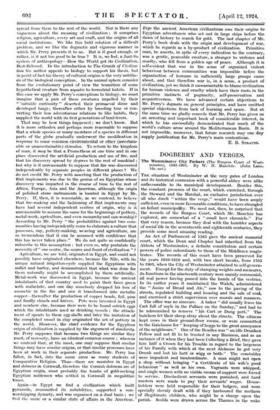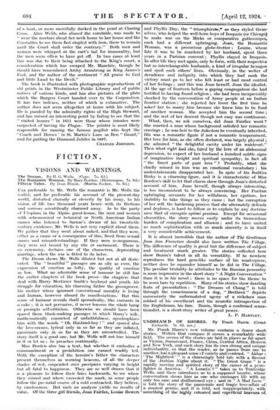DOGBERRY AND VERGES.
The Westminster City Fathers (The Burgess Court of West- minster), 1685-1901. By W. H. Manchee. (John Lane.
16s. net.)
Tan situation of Westminster at the very gates of London and its historical connexion with a powerful abbey were alike unfavourable to its municipal development. Besides this, the constant presence of the court, which exercised, through the Steward and the Marshal, an exclusive jurisdiction over all who dwelt " within the verge," would have been amply sufficient, even in more favourable conditions, to have strangled an infant municipality. We need not, then, be surprised that the records of the Burgess Court, which Mr. Manchee has explored, are somewhat of a " small beer chronicle." For that very reason, because they deal with the humbler aspects of social life in the seventeenth and eighteenth centuries, they provide some most amusing reading.
An Act of Parliament of 1585 gave the ancient manorial court, which the Dean and Chapter had inherited from the Abbots of Westminster, a definite constitution and certain powers of police subordinate to those of the Middlesex magis- trates. The records of this court have been preserved for the years 1610-1616 and, with two short breaks, from 1705 to 1901, when the City of Westminster attained to self-govern- ment. Except for the duty of stamping weights and measures, its functions in the nineteenth century were mainly ceremonial, all real power having passed into the hands of the vestries. In its earlier years it maintained the Watch, administered the " Assize of Bread and Ale," saw to the paving of the streets, regulated building and housing and the sale of coal, and exercised a strict supervision over morals and manners.
The office was no sinecure. A baker " did usually leave his Cart full of soyle in the Pallace on the Sunday," and had to be admonished to remove " his Cart or Dung pott." The butchers let their sheep stray about the streets. The citizens kept cows in their ground-floor rooms, or were committed to the Gatehouse for " keeping of hoggs to the great annoyance of the neighbours." One of the Beadles was " an idle Drunken Fellow and not fit to be trusted in any Business, and as an instance of it when they had been Collecting a Brief, they gave him half a Crown for his Trouble in regard to the largeness of his Family with which at the next Alehouse he got very Drunk and lost his hatt or wigg or both." The constables were impudent and insubordinate. A man might not open a shop without bringing " a Certificate of his wife's good behaviour " as well as his own. Vagrants were whipped, and single women with no visible means of support were forced to service. Disobedient servants were punished, and hard masters were made to pay their servants' wages. House- holders were held responsible for their lodgers, and were specially sternly dealt with if they harboured the mothers of illegitimate children, who might be a charge upon the parish. Scolds were drawn across the Thames in the wake
of a boat, or more mercifully ducked in the pond at Charing Cross. Alice Webb, who abused the constable, was made to " wear the mortars about her neck home to her house and the Constables to see them fast stapled with iron, there to remain until the Court shall order the contrary." Both men and women were whipped at the cart's tail for immorality, but the men seem often to have got off. In two cases at least this was due to their being attached to the King's court, a consideration which has escaped Mr. Manchee, though he should have remembered Archy Armstrong as King James's Fool, and the author of the sentiment " All praise to God and little Laud to the Devil."
The book is illustrated with photographic reproductions of old prints in the Westminster Public Library and of public notices of various kinds, and has also pictures of the plate which the Burgess Court handed over to the Corporation. It has two indexes, neither of which is exhaustive. The author does not seem altogether at home with his subject. He is puzzled by the admiralty rights of the High Steward, and has missed an interesting point by failing to see that the " visited houses " in 1611 were those whose inmates were suspected of having the Plague. The printer is most likely responsible for naming the famous pugilist who kept the ' Coach and Horses ' in St. Martin's Lane as Ben " Gaunt," and for putting the Diamond Jubilee in 1887.
CHARLES JOHNSON.











































 Previous page
Previous page